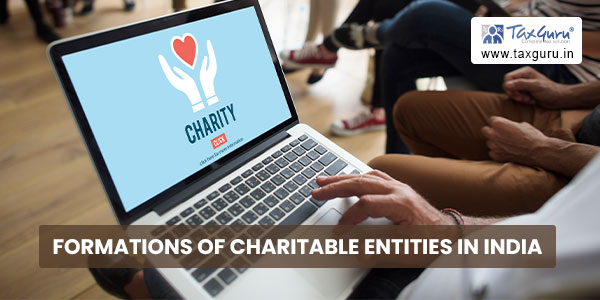—”The term ‘charity’ connotes altruism in both thinking and deed. It entails thinking about others rather than oneself.” In the matter of Andhra Chamber of Commerce [1965] 55 ITR 722 (SC), the Supreme Court ruled that.
INTRODUCTION
It is vital to understand the concept of Charitable Purpose. Section 2(15) of the Income Tax Act 19611, as well as section 9 of the Bombay Public Trust Act 19502, describe charitable purposes. Relief for the poor, education, yoga, medical relief, environmental preservation (including watersheds, forests, and wildlife), preservation of monuments or places or objects of artistic or historic interest, and advancement of any other object of general public utility are all included in Section 2(15) of the Income Tax Act 1961. Section 11 of the Income Tax Act 1961 exempts trusts established for the worship of idols and the execution of spiritual or religious festivals, even if they are for the benefit of a certain faith, community, or caste. It include poverty relief, education, and medical assistance, as well as the growth of other public goods.

METHOD OF FORMATION
Charitable institutions are usually organised in one of the following ways:
1. Companies: If an association is set to be formed as a limited company for the purpose of promoting charity or any other desirable cause, it may be registered under section 8 of the Companies Act, 20133. Two directors and two shareholders are minimum members required to establish a company, it should be noted that the directors may also be the shareholders. Vital documents such as MOA (Memorandum of association) and AOA (Articles of association) are needed as well. The legal right over the property under companies is held in the name of the company. The registration period is approximately 30-45 days. A company registered under Section 8 of the Companies Act, 2013, qualify for FCRA; provided the following conditions are satisfied:
a) The particular individual or entity holds a definite cultural, economic, educational, religious or social program.
b) The particular individual or entity is registered with the FCRA by obtaining prior permission from the Central Government.
c) The particular individual or entity doesn’t fall among the list of prohibitions specified under Section 3 of the FCRA Act, 2010.
2. Societies: Apart from the members of the governing body, secretary, or trustees, a society registered under section 20 of the Societies Registration Act 18604 is a legal entity. A minimum of seven people are needed to establish a Society. Vital documents such as MOA (Memorandum of association) and rules and regulations are needed to form a society. The legal right over the property is held in the name of the society. The registration period is approximately 20-25 days.
3. Charitable Trust: For private trusts, the Indian Trust Act, 18825, establishes and governs the trust. Except in a few states, such as Gujarat and Maharashtra, which have their own state laws, general law is applied to public trust. To create a trust, you’ll need at least two trustees. To create a trust, you’ll need a crucial document called a trust deed. The trustee holds the legal title to the property. The registration process takes about 15-20 days.
FEW IMPORTANT POINTS RELATED TO CHARITABLE AND RELIGIOUS TRUSTS
1. In the case of a Charitable Trust, corpus donations are not regarded an application of revenue.
Any contribution made by a charitable or religious trust or institution to another trust or institution registered under section 12AA with the express intent that it become part of the recipient trust/corpus institution is not treated as an application of income under section 11 for the donor trust/institution. It means that corpus donations will not be counted as an income application.
2. Modifications to the objects indicated at the time of the charitable firm’s registration:
It means that if a trust or an institution has been granted registration and then adopts or undertakes modifications of the objects that do not comply with the conditions of registration, it must apply for new registration within thirty days of the adoption or modifications of the objects in the prescribed form and manner.
3. Section 139(4A) requires the filing of a return of income.
Section 12A has been changed to introduce a new requirement that a person who receives income subject to income tax file a return of income within the time constraints set out in section 139(4A) of the Income Tax Act.
4. Receipt of money or property for insufficient or no consideration by any person under section 56(2)(X):
The Finance Act 2017 added clause (x) to section 56(2) to restrict charitable or private trusts from receiving money or property for inadequate consideration or without consideration. With the addition of this clause, any money or property received for insufficient compensation or without consideration in excess of Rs. 50,000 will be subject to income tax in the hands of the receiver under the heading “Income from other sources.”
As a result, any property received by a charitable trust or a private trust for insufficient consideration or without consideration in excess of Rs. 50,000 will henceforth be liable to income tax under the head “Income from other sources” under section 56(2)(x) in the hands of the recipient trust. This newly included clause(x) in section 56, however, does not apply to any money or property received:
a) from any fund, foundation, university, or other educational institution, hospital, or other medical institution, or any trust or institution referred to in clause (23C) of section 10.
b) from or on behalf of any trust or institution that has been registered under sections 12A or 12AA.
c) by any fund, trust, or institution, or any university or other educational institution, or any hospital or other medical institution, as defined in clause (23C) of section 10, sub-clause (iv), sub-clause (v), sub-clause (vi), or sub-clause (via).
d) from an individual by a trust established only for the benefit of the individual’s relatives.
It is vital to highlight that the trusts and institutions described above are not covered by Section 56(2)(x). This provision exempts trusts registered under Section 12A and selected institutions registered under Section 10(23C) from being taxed on donations received by these trusts.
5. Restriction on Cash Donations under section 80G:
Section 80G of the Finance Act of 2017 was changed to provide that no deduction shall be permitted under section 80G in respect of a donation of more than Rs. 2,000/- unless the donation is made via a method other than cash. Previously, the limit was Rs. 10,000/-. This measure was taken by the government in order to provide a cashless economy and greater transparency.
INCOME TAX BENEFITS – CHARITABLE TRUST AND NGO
The efforts of such institutions contribute significantly to the government’s economic development and social welfare goals. Their outreach and more localised approach aids in identifying those in need and providing assistance. As a result, the Indian government has granted charity organizations with a variety of tax incentives and exemptions, the most notable of which is Section 80G.
| S.No. | CATEGORY OF INCOME | INCOME SUBJECT TO TAX | TAXABILITY |
| 1. | Donations/voluntary contributions | Voluntary contributions with a specific direction to form part of corpus of trust or institution | Exempt |
| Voluntary contribution without such specific direction | Forms part of income from property held under trust | ||
| 2. | Anonymous donations i.e., donations where donee does not maintain record of identity/any particulars of the donor | Donation exceeding higher of: i) 5 percent of total donations received by trust or ii) Rs 1,00,000 |
Taxed at 30 percent |
| Anonymous donation received by trust established wholly for religious and charitable purpose on | Taxable in the same manner as voluntary contributions (without specific direction) as above | ||
| 3. | Income from property held under trust for charitable or religious purpose | Income applied for charitable or religious purpose in India | Exempt |
| Income accumulated or set aside for the application towards charitable or religious purpose in India | Exempt* up to a maximum of 15 percent of such earnings This means that in India, at least 85 percent of property revenue must be used for charity and religious purposes, with the remaining 15 percent accumulating or set aside. | ||
| 4. | Income from property held under trust created for charitable purpose which tends to promote international welfare in which India is interested | CBDT either by general or special order has directed that such income shall not be included in the total income of trust | Exempt |
-Only Charitable/ religious trust or institution registered under Section 12AA enjoys the exemption.
NOTE: The transferor of the property, i.e. the settlor or author of the trust, must be legally capable of contracting. Similarly, the trustees should be contracting-competent individuals. It is also critical that the trustees signify their agreement to function as trustees in order for the trust to be valid. When a valid trust is established and property is transferred to the trust, it cannot be revoked. However, if the trust deed contains any provision for revocation, the provisions of sections 60 to 63 of the Income-tax Act will apply, and the trust’s income will be taxed as personal income in the hands of the settlor.
CONCLUSION
It is an irrefutable fact that any legislator who violates the Indian Constitution would perish. We, the people of India, have resolved to form a lay, socialist, republican union in accordance with the Preamble of the Indian Constitution. One could argue that if we live in a secular India, a lawmaker will favour non-secular activity by exempting it from taxation laws. However, according to Indian’s constitution, the state is agnostic to religions and cannot be religiously biased. However, India has a rich religious tradition, and India is the birthplace of four main world religions: Hinduism, Sikhism, Buddhism, and Jainism. As a result, it is the State’s responsibility to protect and promote this history. As a result, it is constitutionally valid. Furthermore, each Indian citizen has the right to observe the religion of his or her beliefs. So, if the state imposes taxes on non-secular activity, it will be tantamount to stifling Indian citizens’ liberties.
1.Income Tax Act, 1961
2. Bombay Public Trust Act, 1950
3. Companies Act, 2013
4. Societies Registration Act, 1860
5. The Indian Trust Act, 1882
****
Author: Advocate Rohit Hooda, B.Com.LL.B(H).






For further enquiry contact me at 8447251449 xoxo